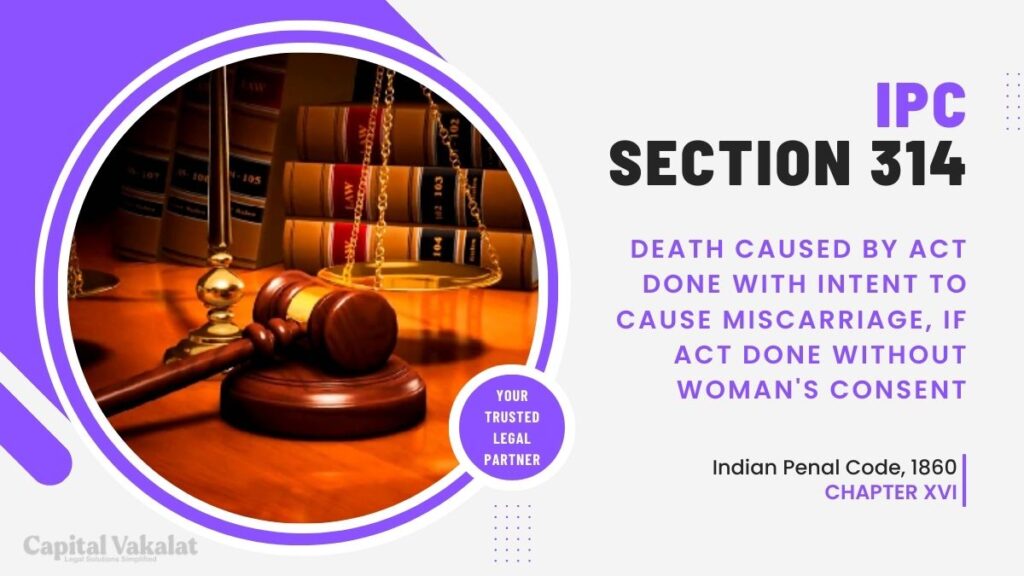In the realm of legal statutes, Section 314 of the Indian Penal Code (IPC) stands out as a provision that deals with a sensitive and complex issue – the act of causing miscarriage with the intent to cause death, particularly when done without the woman’s consent. This article delves into the various facets of Section 314 IPC, exploring its nuances, intent, legal ramifications, historical evolution, controversies, and the international landscape. Let’s embark on a journey to unravel the complexities surrounding this provision.

Understanding Section 314 IPC requires a careful examination of its language and intent. This legal provision is designed to address cases where an individual deliberately causes a miscarriage, leading to the woman’s death, and crucially, when such an act is performed without her consent.
Understanding Section 314 IPC
Section 314 IPC is a pivotal legal provision that addresses the intentional act of causing miscarriage resulting in the woman’s death. To comprehend this provision fully, it’s essential to break down its elements, exploring the conditions that must be met for an offense to be established.
Intent to Cause Miscarriage
The core of Section 314 lies in the intent behind the act. It is not merely about the act of causing a miscarriage but the deliberate intention to cause death in the process. Unraveling the intricacies of intent and its legal implications is crucial in understanding the severity of the offense.
Consent in Section 314 IPC
A woman’s consent plays a pivotal role in cases falling under Section 314 IPC. Examining the legal implications when the act is performed without the woman’s consent sheds light on the significance of autonomy in reproductive choices and the consequences when such autonomy is violated.
Legal Ramifications
The legal consequences outlined in Section 314 IPC are severe. Offenders face stringent penalties, including imprisonment, but understanding the practical application of these penalties requires a closer look at relevant case studies that have shaped the interpretation of this provision.
Historical Context
To comprehend the evolution of Section 314 IPC, one must delve into its historical context. How has this provision transformed over the years, reflecting the changing societal attitudes towards reproductive rights and the legal protection of women?
Controversies and Debates
Like many legal provisions, Section 314 IPC is not immune to controversies and debates. Public opinions on the moral, ethical, and legal aspects of this provision vary, and ongoing debates within legal circles continue to shape its interpretation and application.
International Comparisons
Comparing Section 314 IPC with similar laws globally provides valuable insights. Understanding how other countries address acts done with intent to cause miscarriage and the death resulting from it offers a broader perspective, potentially informing legal reforms.
Challenges in Prosecution
Prosecuting cases under Section 314 IPC comes with its set of challenges. From the difficulties in proving intent to the impact on legal proceedings, addressing these challenges is crucial for ensuring justice in such sensitive matters.
Ensuring Women’s Rights
Advocacy for women’s rights in cases falling under Section 314 IPC is an ongoing endeavor. Exploring potential legal reforms and initiatives aimed at safeguarding women’s autonomy in reproductive choices is essential to address the inherent complexities of this legal provision.
Conclusion
In conclusion, Section 314 IPC stands as a poignant legal provision dealing with a delicate balance between reproductive autonomy, criminal intent, and the sanctity of human life. Navigating the complexities surrounding this provision requires a nuanced understanding of legal, historical, and societal perspectives. As debates continue and legal landscapes evolve, the quest for justice and the protection of women’s rights remain at the forefront.
Frequently Asked Questions
Are there any recent amendments to Section 314 IPC?
As of my knowledge cutoff in January 2022, there may have been amendments or developments. It’s advisable to check the latest legal updates or consult legal experts for the most current information.
How do international laws differ regarding acts done with intent to cause miscarriage?
Different countries have varying legal frameworks on this matter. Some may have stricter or more lenient regulations. Studying international laws can provide insights into diverse approaches to similar issues.
What challenges do prosecutors face in proving intent under Section 314 IPC?
Proving intent can be challenging, as it often involves subjective factors. The prosecution may face difficulties in establishing the accused’s state of mind at the time of the act.
What role does historical context play in the interpretation of Section 314 IPC?
The historical evolution of this legal provision can influence its interpretation. Changes in societal attitudes over time may impact how the law is applied and perceived.